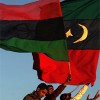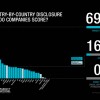Antonia Bosanquet, Transparency International’s Arab media specialist, looks at Libya’s future as seen by Arab-language online media. It’s over and the end was cleaner than any of the NATO allies dared to hope; instead of the “grubby compromise” between rebels and Ghaddafi loyalists that was predicted by analysts, the rebels surprised the world by storming […]

Libya: will this be the next Iraq?

Looking to a new Libya
As Transparency International asks the G20 Anti-Corruption Working Group to prioritise anti-bribery laws, asset recovery and money laundering ahead of the Cannes G20 Summit, Transparency International’s Group Director for Research & Knowledge Robin Hodess reflects on relevance of the disastrous and destabilising impacts the failure to address corruption has had in Arab Spring countries such […]

Should banks profit from dictators’ money?
As Libya prepares for the future, what are financial centres doing to stop the flow of stolen assets from dictators? The following is adapted from a speech made by Transparency International’s vice-chair, Akere Muna, at the UN public service forum in Dar es Salaam, United Republic of Tanzania. If corruption, especially money laundering and […]

Digital Technologies And The Arab Spring – Part two
In the second part of his article, Johnny West, author of a new book based on his personal experience of the Arab Spring, writes about the potential of social media in the post-revolution Arab world. Read part one here. In Tunisia, digital technologies have started to provide transparency in the political arena in an interesting […]

Digital Technologies And The Arab Spring – Part one
In a two-part article, Johnny West, author of a new book based on his personal experience of the Arab Spring, writes about the role of social media in the revolution. Sometimes hype is justified. Earlier this year, the airwaves and opinion columns of media around the world were full of talk of Facebook revolution in […]

Corruption: a crime against society
The following is an excerpt from the collected papers of the Rencontres Economiques d’Aix-en-Provence 2011. Read the full article here. Corruption is often thought of as an economic or “white collar crime”. That ignores the greater implications of corruption, the abuse of power at the expense of the many, which perpetuates social injustice and the […]

Putting the corruption fight on the political agenda in France
The biggest challenge for TI France is intensifying international efforts for better governance – a prerequisite for sustainable development – at home and abroad We are making inroads. The magazine Acteurs publics gave TI France their 2010 award for best communicator in the category “associations and great causes” for our activities on lobbying regulation […]

Oil wealth and revolution
Today Transparency International publishes its report on the transparency of oil and gas companies. The report shows that the majority of companies do not reveal payments to governments in countries where the extract oil and gas. A good example for what this means in practice is Libya: A quarter of the country’s economy come from […]
- State Capture in South Africa 14 February 2017
-
 What’s next for Ukraine?
16 December 2016
What’s next for Ukraine?
16 December 2016
-
 Cleaning up sport: conflicts of interest at the top
9 December 2016
Cleaning up sport: conflicts of interest at the top
9 December 2016
-
 OGP: France must do more to tackle corruption
9 December 2016
OGP: France must do more to tackle corruption
9 December 2016
-
 Pharma companies in Slovakia: Uncovering conflicts of interest
9 December 2016
Pharma companies in Slovakia: Uncovering conflicts of interest
9 December 2016
-
Nokubonga Ndima: Young people can make a change for a better future...
-
Benjamin M: Very good article! Congrats!...
-
arun kottur: In India sports minister was involved decades are ...
-
Ekonomi: Very beneficial article. Thank you very much. htt...
-
ksweeney1: I do not agree that https://apex.aero/2016/09/22/g...
Search
Categories
Latest news from Transparency International
No items, feed is empty.

 Connect with us on Facebook
Connect with us on Facebook Follow us on Twitter
Follow us on Twitter